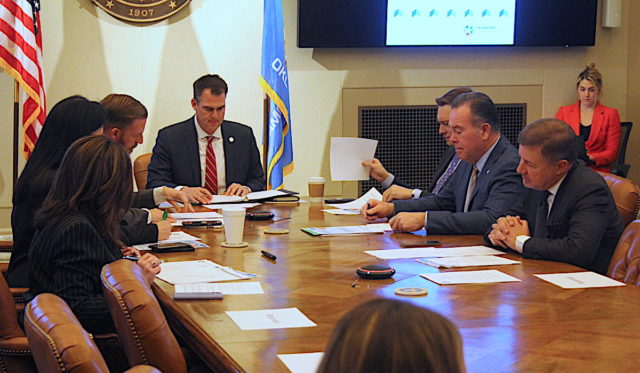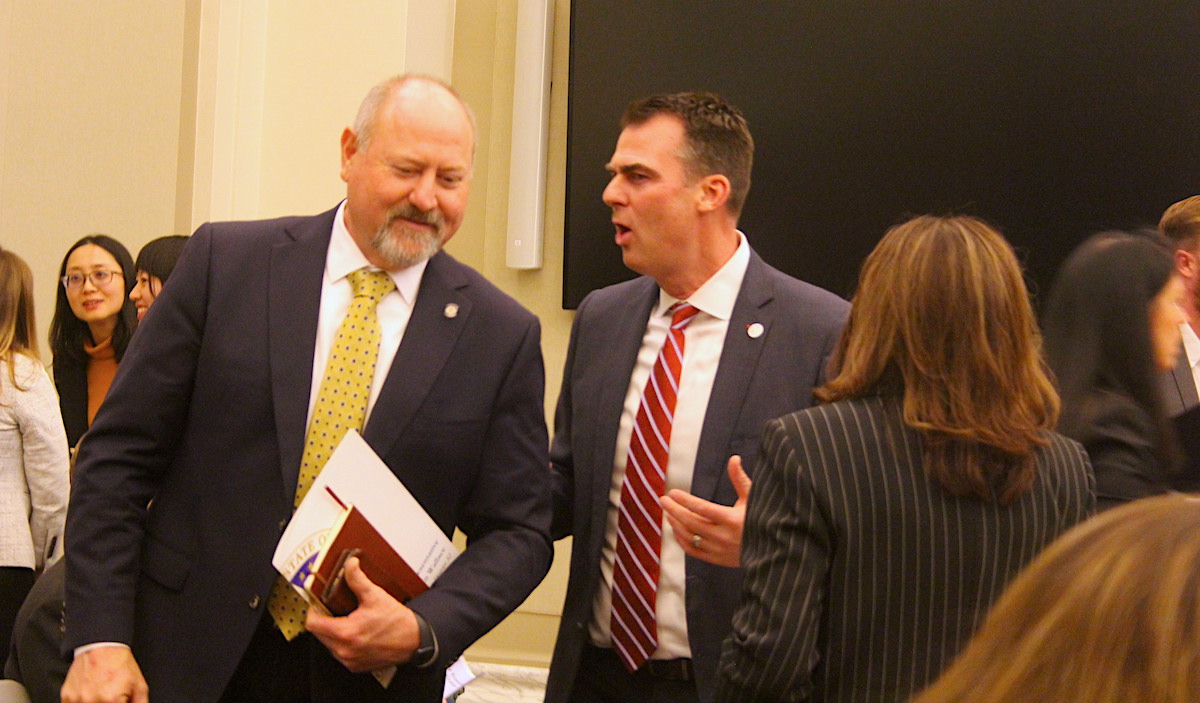
In its annual certification of various and sundry complicated state revenue figures, the Oklahoma Board of Equalization told the Legislature that it has more than $12.4 billion that it can appropriate this session. But with $1.3 billion of that being prior-year surplus and $256 million in one-time American Rescue Plan Act federal funding, lawmakers are likely to craft a Fiscal Year 2024 budget that is roughly $1 billion larger than what they approved last year.
In addition, the board approved a statutorily-triggered $249 million deposit into the Revenue Stabilization Fund because revenues are exceeding the prior five-year state average. Combined with a roughly $300 million decreased estimate for next year based on slightly lower oil and gas price estimates, that number meant lawmakers’ appropriation authority for FY 2024 is about $600 million lower than state leaders anticipated in December.
“We still have a $1.1 billion surplus over reoccurring expenses,” Gov. Kevin Stitt said after the meeting. “And our savings is looking really good.”
Friday’s meeting came one day after House Republican leaders unveiled and advanced an education funding and reform package that would increase public school appropriations $500 million and would create a “parental choice” tax credit with a potential impact between $250 million and $300 million.
Senate Appropriations and Budget Chairman Roger Thompson (R-Okemah) attended the Board of Equalization meeting and, afterward, he tossed room-temperature water on the House’s massive education proposal.
“I’m very much concerned with what came out of the House yesterday on spending $800 million on education,” Thompson said. “Out of certified funds that we would have to appropriate this year, that would leave us $167 million (for other new investments).”
Thompson said lawmakers have additional obligations that will take new appropriations, including a potential $22 million supplemental appropriation to finish a derailed construction project for a new veterans home in Sallisaw. In his own legislation, Thompson is also proposing investments on criminal justice reform, and historically he has attempted to move the state’s court system away from being funded by fines and fees.
“We don’t even have all the fiscal impacts yet produced on all the bills we are running, so we don’t know where we are yet,” Thompson said. “This is the beginning of the process.”
‘Nobody ever gets everything they want’

With the Legislature only in its second week of session, the House moved its queen to the center of the proverbial chess board Thursday by announcing its massive education proposal. House Appropriations and Budget Chairman Kevin Wallace said it’s undeniable that, if passed, the House’s proposal would “have an impact” on the rest of the year’s budget negotiations.
“I’ve already heard the talking point from the Senate that it’s got too big of a price tag, so I’m sure we’ll get something back that might be reduced,” said Wallace (R-Wellston). “We’ll have to see what all makes it through this system as far as both chambers and the impact on the bills. I’m sure there will be a lot of intense negotiations, but we will come up with a good solution.”
Thompson said the new revenue projections and the high price tag of the House’s education proposal complicate the governor’s call for tax cuts.
“For me, I’ve always been very hesitant to do tax reform or tax cuts. I think that we’ve got to take that very, very seriously,” Thompson said, adding that the state is seeing a roughly 6.8 percent rate of inflation. “I think we are at the beginning of less revenue in the state of Oklahoma.”
House leaders have shown a slightly greater appetite for tax cuts, but Wallace noted that the education proposal and tax cut proposals cannot be viewed in a vacuum. Elimination of the state sales tax on groceries would reduce appropriations by an estimated $351 million per year.
Meanwhile, Stitt has proposed a 0.76 percent reduction in the personal income tax rate, which would cause a $520 million full-year reduction in revenue collections. Stitt also proposed a 0.75 percent cut to the corporate income tax rate, which would decrease collections about $92 million over a full year.
“If you look at everybody’s want list, nobody ever gets everything they want — not the House, the Senate or the executive,” he said. “So that will be the posturing (on the House education proposal): too big a price tag. The Senate is opposed to tax cuts, especially the grocery or the income, so we will end up having those negotiations to find a happy medium and move forward.”
Thompson said the House’s proposal to create new refundable tax credits of $5,000 per child attending private school and $2,500 per child being homeschooled needs to be examined closely. The refundability of the proposed tax credits means that families could still claim the credits and receive cash payments even if they did not have income tax liability.
“I am not thrilled about refundable tax credits. I think you are starting something with this particular bill that is going to impact Oklahoma for a long time, because if you put that much money into education, I don’t see anybody voting to cut education,” Thompson said. “I care about education, but I also care about the other services in the state of Oklahoma, and I think we have to look at the full package of what is good in the state of Oklahoma.”
Friday’s meeting of the state Board of Equalization was the body’s first since new Attorney General Gentner Drummond, Superintendent of Public Instruction Ryan Walters and State Treasurer Todd Russ were sworn into office in January.





















